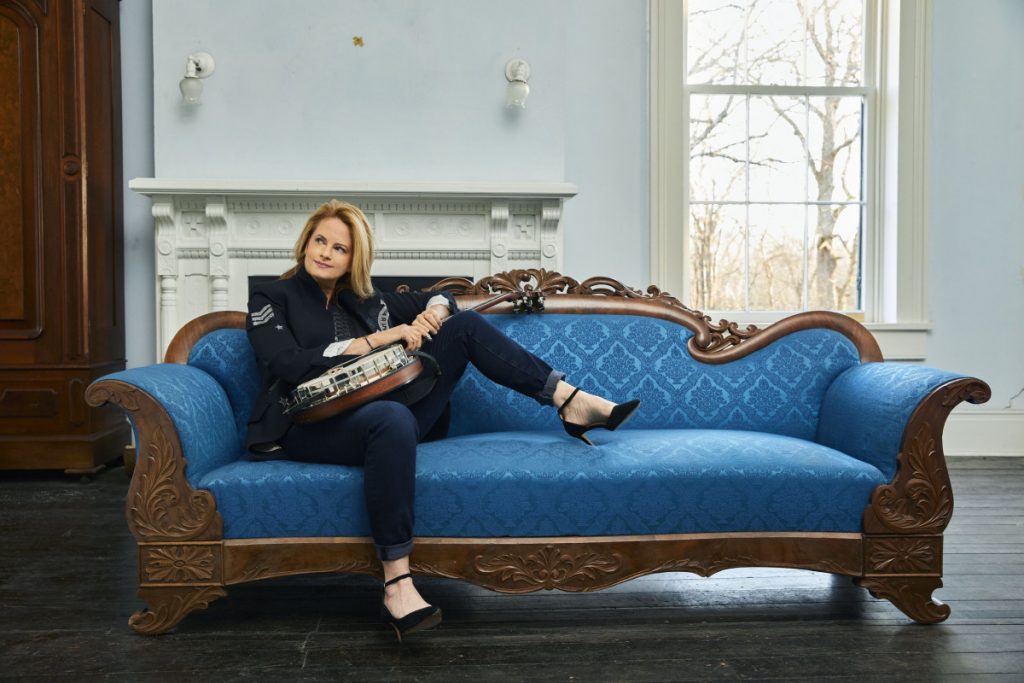
Julia Weber
Staff writer
Banker-turned-banjoist Alison Brown is ready for her first performance at Chautauqua when she takes the stage at 8:15 p.m. tonight in the Amphitheater.
Since becoming a full-time musician, she has spent time in Alison Krauss’ Union Station band and has collaborated extensively with the likes of Bela Fleck, Stuart Duncan, the Indigo Girls, Taj Mahal and The Band. She’s won a Grammy Award and is the first woman to win an International Bluegrass Music Award in an instrumental category. But for Brown, beyond the accolades, the banjo has always been an important part of her life.
“I’ve always loved music,” she said. “I love the sound of the instrument. I love the community. The bluegrass and roots community is full of so many musically generous, kind people and diverse people, and I’ve always really loved belonging to that community.”
She started playing the banjo when she was 10 years old. In college, though, she studied business and later worked in the public finance side of investment banking.
“I just didn’t feel like I had the passion for it,” she said. “Rather than thinking about bond structures, I was thinking about ‘I wonder when I could play my banjo again.’ ”
Brown decided to take a break from her banking job to focus on her music for a little while, and she never went back.
Despite not returning to her career in finance, Brown finds her understanding of business, economics and finance to be very helpful because it helped her to start and run her record label, Compass Records.
Brown started the label with her now-husband Garry West, deciding it was the logical step given her expertise in business and West’s expertise in music production. Brown said that the two started the label by “sketching it out on the back of a cocktail napkin while we were on tour and then writing the business plan at the kitchen table.”
Brown’s newest album was released in May of this year through her label, Compass Records. For the bluegrass musician, the album came primarily out of her desire to work with other artists whom she admires.
“I was thinking about people that I wanted to collaborate (with) and write tunes for, so that’s what I did.”
Brown’s latest project was conceptualized and recorded in the midst of the beginning of the COVID-19 pandemic. She said that although the pandemic presented many challenges for musicians, it also opened up opportunities to collaborate.
Many artists who might normally have been very busy found themselves at home with time on their hands to create. Through phone calls and Zoom meetings, Brown was able to collaborate with others, writing music and working out new material together virtually.
For Brown, part of the allure of the banjo is the rich history of the instrument.
“The banjo is a fascinating instrument because it really embodies so much of American history,” she said. “If you start off with just its construction, (it’s) basically a drum with a neck attached. That in itself reflects African influences in the drum and European influences with the strings. It’s a mini, little sample of America.”
She’s particularly interested in how its purpose and regional popularity have both shifted so much throughout history. She said that she is interested in how the instrument has been adopted by different communities throughout its existence, and how the instrument has changed from being associated with both the south and the north historically.
“It’s endlessly fascinating,” Brown said. “To me, it’s not just an instrument, it’s telling the story of America at the same time.”
She’s excited to bring her music and the rich legacy of the banjo to Chautauqua this evening. She especially loves when attendees experience a newfound enjoyment of the banjo during her shows.
“One of my favorite things is that people come to one of our shows and say ‘I didn’t know I liked the banjo, but I love the banjo,’ and that’s always my goal,” she said. “To me, it’s such an incredible instrument; its history is so deep; its musical breadth is so much more broad than most people realize. I like to shine a light on what is special about the banjo through a show that combines my original tunes with cover tunes and some songs so that there’s music people recognize, there’s new music, and all of it highlights the amazing versatility of the five-string banjo.”




